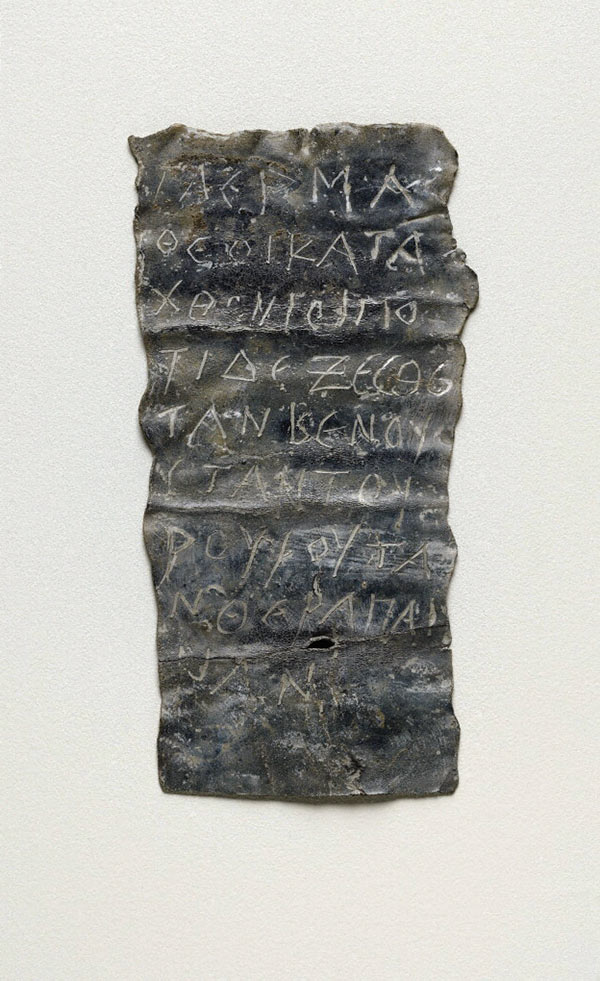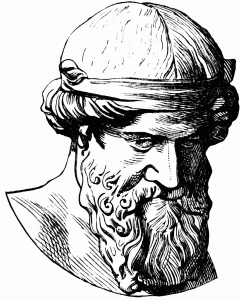Chapter 6: Folk Religion and Magic
Attic red-figure kalyx-krater, c. 440 BCE, Odysseus pursuing the enchantress Circe
Chapter Introduction
This chapter examines an aspect of Greek religion that is often overlooked: magic. As the assigned readings demonstrate, it is remarkably challenging to provide a suitable definition for the Greek concept of “magic”, but one thing is  clear: the ancient use of “magic” (the word is based upon the Persian magu) had many forms and purposes and has produced an array of fascinating evidence, from binding spells scratched into lead curse tablets, to wax or terracotta “voodoo” dolls pierced with nails, to literary references from poets, philosophers and orators. Far from being confined to the fringes of society, the many references to magic indicate that it pervaded Greek life. While traditional civic religion bound communities together in common worship, magic was much more personalized, revealing a great deal about the people who comprised Greek society, their desires, motivations, their suspicions and insecurities. The evidence related to the use of magic humanizes and individualizes everyday Greeks in a way that most source material does not, as it gives voice not just to the elite members of society, but to a much larger and more diverse group of individuals who populated the Greek city-states and countryside.
clear: the ancient use of “magic” (the word is based upon the Persian magu) had many forms and purposes and has produced an array of fascinating evidence, from binding spells scratched into lead curse tablets, to wax or terracotta “voodoo” dolls pierced with nails, to literary references from poets, philosophers and orators. Far from being confined to the fringes of society, the many references to magic indicate that it pervaded Greek life. While traditional civic religion bound communities together in common worship, magic was much more personalized, revealing a great deal about the people who comprised Greek society, their desires, motivations, their suspicions and insecurities. The evidence related to the use of magic humanizes and individualizes everyday Greeks in a way that most source material does not, as it gives voice not just to the elite members of society, but to a much larger and more diverse group of individuals who populated the Greek city-states and countryside.

The readings in this chapter provide detailed discussions of magic, which is sometimes referred to variously as “unlicensed religion” or “personal religion”. It is stressed that magic could be either beneficial (e.g. healing) or detrimental (e.g. causing mental or physical harm). While literary sources tend to view the use of magic in a negative light, with practitioners who received pay for their work sometimes described as false prophets or “quacks”, there is no evidence of any laws prohibiting its use (although charges for things such as “impiety”, asebeia, might be levied). On the contrary, the sheer amount of evidence attests to the importance of magic in the sphere of Greek religion.

Tasks: Complete the readings, below, then go to the Blackboard course page. Don’t forget that you’ve also been assigned primary source reading: Greek Religion, V. Warrior, Chapter 13. Take the Module Test and contribute to Discussion Topic 5. You have TWO WEEKS to complete this Module.
NB: The Module Test will involve questions based upon Readings 1-4. Discussion Topic 5 refers to the assigned reading from the sourcebook and Reading 5.
This chapter includes the links to the readings (see below). When you click the links, you may have to log in with your CSU library ID and password. PDF copies of all of the readings are available in the One Drive folder (see the left-hand menu of the course Blackboard page for the link to One Drive).
Reading 2: “Binding and Bewitchment”, in R. Parker, On Greek Religion (2011), pp. 59-62
Reading 3: “Personal Religion: a productive category for the study of ancient Greek religion?”, J. Kindt, The Journal of Hellenic Studies 135 (2015)
** Reading 5: “Patterns of Persecution: ‘Witchcraft’ Trials in Classical Athens”, E. Eidinow, Past & Present 28 (2010)
** For Discussion Topic 5 only (not included on the Module Test)

